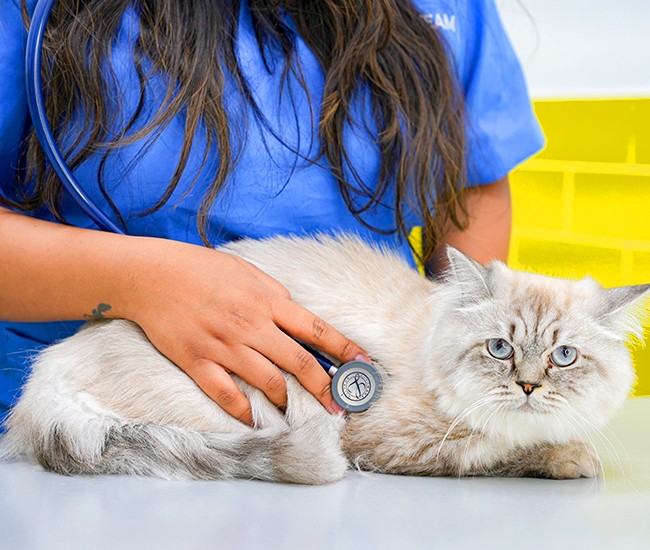
Wellness Check-up
At Vet Plus, we believe that regular wellness exams are essential for maintaining your pet’s health and well-being. During your pet’s visit, we provide a comprehensive evaluation of all organ functions and screen for a variety of conditions, including:
- Weight management: Maintaining a healthy weight is important for your pet’s overall health and longevity. We’ll work with you to establish a healthy diet and exercise plan for your pet.
- Dental health: Dental disease can lead to serious health issues, including heart disease and kidney disease. During a wellness exam, we’ll evaluate your pet’s dental health and provide recommendations for dental care.
- Skin and coat health: Skin and coat problems can be a sign of underlying health issues. We’ll evaluate your pet’s skin and coat and provide recommendations for care.
- Heart and lung function: We’ll listen to your pet’s heart and lungs to evaluate their function and screen for any signs of heart or lung disease.
- Joint function: Joint problems can be a common issue for many pets, particularly as they age. We’ll evaluate your pet’s joint function and provide recommendations for care.
- Nutrition: Proper nutrition is essential for your pet’s health and well-being. We’ll evaluate your pet’s diet and provide recommendations for a balanced and healthy diet.
How Often Should Wellness Exams Be Performed?
The frequency of wellness exams can depend on your pet’s age, breed, and overall health. As a general guideline, we recommend annual wellness exams for most pets. However, for senior pets or those with chronic health conditions, more frequent exams may be recommended.
Puppies and kittens typically require more frequent wellness exams, as they are still developing and growing rapidly. During their first year, we recommend wellness exams every 3-4 months to ensure they are on track with their development and to provide necessary vaccinations.
As your pet ages, more frequent wellness exams may be necessary to monitor for age-related health issues. For senior pets, we recommend wellness exams every six months to ensure any potential health problems are identified and treated as soon as possible.
Of course, every pet is different, and your veterinarian may recommend a different wellness exam schedule based on your pet’s individual needs. It’s important to work closely with your veterinarian to develop a wellness plan that is tailored to your pet’s unique health and wellness needs.
Lab screening services:
To help monitor and maintain your pet’s health. These screening services can include:
- Blood work: Blood work is used to evaluate organ function, blood sugar levels, and overall health. We may recommend blood work as part of a wellness exam, before surgery, or to monitor certain health conditions.
- Urinalysis: A urinalysis is used to evaluate kidney function, detect urinary tract infections, and identify other health conditions.
- Fecal analysis: A fecal analysis is used to screen for parasites, bacterial infections, and other gastrointestinal issues.
- Heartworm testing: Heartworm testing is used to screen for heartworm disease, a potentially life-threatening condition that is spread by mosquitoes.
- Flea and tick testing: Flea and tick testing can help detect and identify common parasites that may be affecting your pet.
During your pet’s visit, your veterinarian will evaluate your pet’s health and recommend any necessary lab screening services. These services can help identify potential health issues early, before they become more serious, and help ensure your pet receives prompt and effective treatment.
